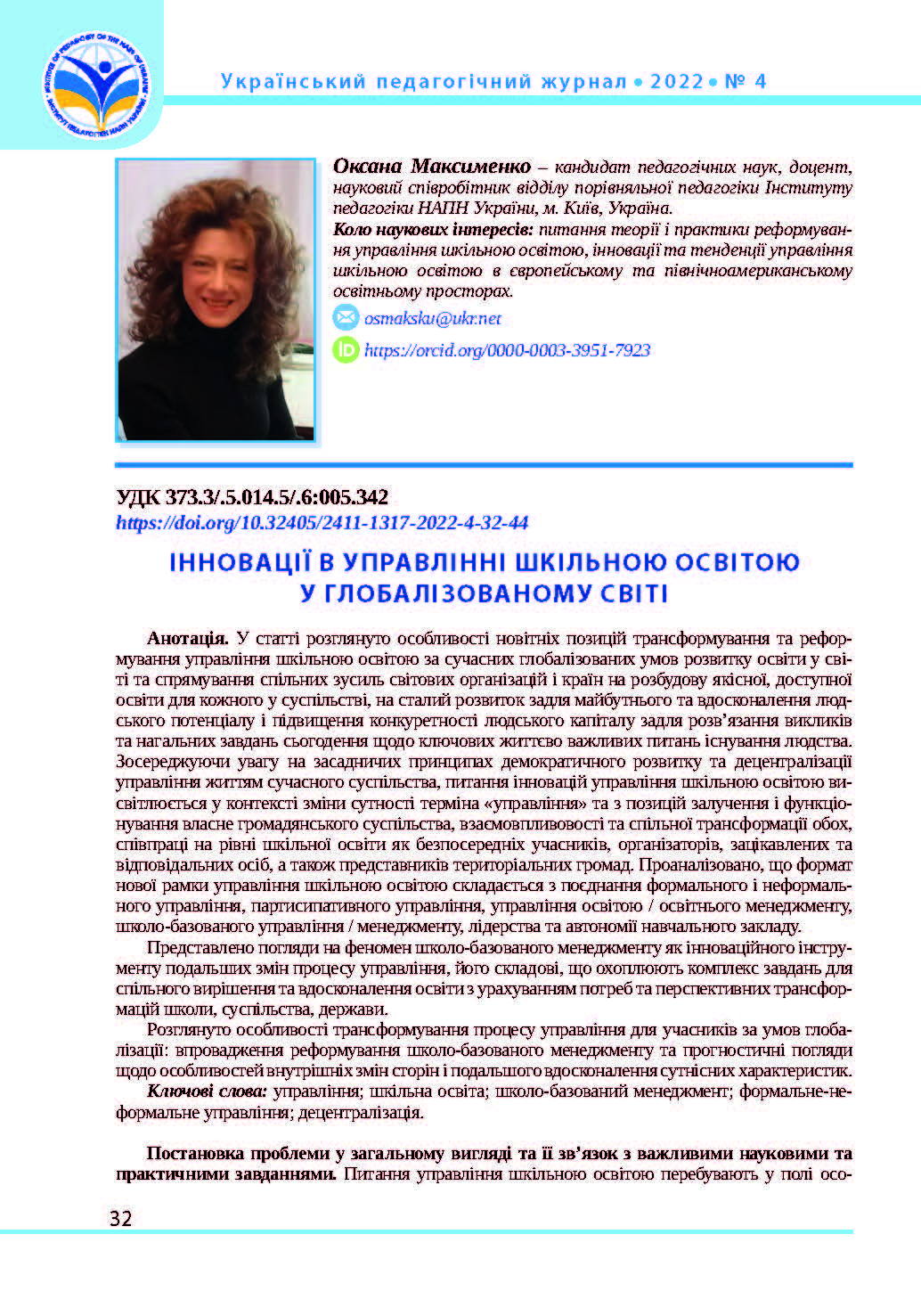Abstract
The article is devoted to the features of the new positions of the transformation and reform of school education management under the contemporary globalized conditions of education development in the world and the direction of joint efforts of the world organizations and countries to build high-quality, accessible, equal education for everyone in a society aimed at the sustainable development for the future and improvement of human potential and increasing the competitiveness of human capital in order to solve the challenges and urgent tasks of today regarding the vital issues of humanity's existence. Focusing attention on the basic principles of democratic development and decentralization of management of the life of modern society, the issue of innovations in school education management is highlighted in the context of changing the essence of the term "management" and from the point of the involvement and functioning of the civil society itself, the mutual influence and joint transformation of both, cooperation at the level of school education as direct participants, organizers, interested and responsible persons, as well as territorially affiliated. It is analyzed that the format of the new school education management framework consists of a combination of formal and informal management, participatory management, education management / educational management, school-based management, leadership and autonomy of the educational institution.
The views on the phenomenon of school-based management as an innovative tool for the further changes in the management process, its components, encompassing a set of tasks for the joint solution and improvement of education, taking into account the needs and perspective transformations of the school, society, state are presented.
The peculiarities of the transformation of the management process for the participants under the conditions of globalization from the introduction of school-based management reform and prognostic views regarding the peculiarities of the internal changes of the parties and the further improvement of essential characteristics are considered.
The list of scientific methods used to identify the peculiarities of the issue includes analysis, description, and comparison.
References
Бєлова, В.В. (2021). Система управління середньою освітою в Англії. Кандидатська дисертація. НАПН України. Інститут педагогіки. https://undip.org.ua/wp-content/uploads/2021/12/Bielova-V.V._Diss_Sept.-19-2-1.pdf
Бойченко, К. В. (2011). Взаємодія школи та громади в управлінні школою: європейський досвід та українські перспективи. Витоки педагогічної майстерності : збірник наукових праць. Полтавський державний педагогічний університет імені В. Г. Короленка. Полтава. 63–68.
Бойченко, М. А. (2010). Тенденції реформування управління сучасною загальною середньою освітою США. Кандидатська дисертація. Полтавський державний педагогічний університет ім. В. Г. Короленка.
Джурило, А.П., Глушко, О.З., Локшина, О.І, Маріуц, І.О., Тименко, М.М., Шпарик, О.М. (2018). Трансформаційні процеси у шкільній освіті країн Європейського Союзу та США. ТОВ «КОНВІ ПРІНТ». https://lib.iitta.gov.ua/713168/1/18-01.pdf
Джурило, А. П. (2015). Актуальні проблеми управління освітніми системами у зарубіжжі: централізація і децентралізація. Український педагогічний журнал, 4, 170‒178. http://nbuv.gov.ua/UJRN/ukrpj_2015_4_22
Калініна, Л. (2017). Науковий дискурс сучасних методологій організаційного механізму управління в сфері освіти. Рідна школа. 1-2. 8–17. http://www.irbis-nbuv.gov.ua/cgi-bin/irbis_nbuv/cgiirbis_64.exe?I21DBN=LINK&P21DBN=UJRN&Z21ID=&S21REF=10&S21CNR=20&S21STN=1&S21FMT=ASP_meta&C21COM=S&2_S21P03=FILA=&2_S21STR=rsh_2017_1-2_4
Локшина, О. І. (2009). Зміст шкільної освіти в країнах Європейського Союзу: теорія і практика (друга половина ХХ - початок ХХІ ст.). СПД Богданова А.М. https://lib.iitta.gov.ua/5435/
Сбруєва, А. А. (2005). Тенденції реформування середньої освіти розвинених англомовних країн в контексті глобалізації (90-ті рр. ХХ - початок ХХІ ст.). Ін-т педагогіки АПН України. http://repository.sspu.sumy.ua/handle/123456789/427
Семяновський, В. М. (2018). Партисипативне управління як модель управління територіальними громадами. Статистика України, 1, 47–51. http://194.44.12.92:8080/jspui/handle/123456789/3424
Тимошко, Г. М. (2011). Сутність поняття «управління» та «менеджмент» в педагогічній теорії і практиці. Теорія та методика управління освітою, 7. http://www.nbuv.gov.ua/e-journals/ttmuo/2011_7/13.pdf
Ярова, О. Б. (2013). Тенденції упровадження європейського виміру у початкову освіту Євросоюзу. Порівняльно-педагогічні студії. 4 (18). 63–72.
Ярова, О. Б. (2016). Школо-базований менеджмент як інструмент демократизації європейської початкової освіти. Наукові записки Бердянського державного педагогічного університету. Педагогічні науки. 1, 342–349.
Barrera-Osorio, F., Fasih, T., Patrinos, H. A., Santibáñez, L. (2009). Decentralized Decision-making in Schools: The Theory and Evidence on School-based Management. Directions in Development; human development. World Bank. https://openknowledge.worldbank.org/handle/10986/2632
Bray, М. (1996). Decentralization of Education: community financing. World Bank. http://www1.worldbank.org/publicsector/decentralization/Feb2004Course/Background%20materials/Bray.pdf
European Commission. (2017, May 30). Communication from the Commission to the European Parliament, the European Council, the Council, the European Economic and Social Committee and the Committee of the Regions. School development and excellent teaching for a great start in life. https://eur-lex.europa.eu/legal-content/EN/TXT/?qid=1496304694958&uri=COM:2017:248:FIN
Fiske, B. Е. (1996). Decentralization of Education. World Bank. https://doi.org/10.1596/0-8213-3723-8
Florestal, K., Cooper, R. (1997). Decentralization of Education. World Bank. https://doi.org/10.1596/0-8213-3933-8
Gaynor, С. (1998). Decentralization of Education: teacher management. World Bank. http://web.worldbank.org/archive/website00238I/WEB/PDF/DID_5.PDF
Lokshyna, O., Dzhurylo, A., Hlushko, O. (2021). Secondary education reform priorities under globalisation: the case of Ukraine in comparison with China, Germany and Poland. SHS Web of Conferences; Les Ulis, Vol. 104, DOI:10.1051/shsconf/202110401004 https://www.proquest.com/openview/d8c4c295a1ab5493e164235e27bd8009/1?pq-origsite=gscholar&cbl=2040545
Lokshyna, O.I., Shparyk, O.M., Dzhurylo, A.P. (2015). The European Vector of School Education Content Transformations in Ukraine Science and Education a New Dimension. Pedagogy and Psychology, III (30), Issue: 59, 7-10. https://lib.iitta.gov.ua/709999/1/The%20European%20Vector%20of%20School%20Education%20Content%20Transformations%20in%20Ukraine.pdf
Moradi S., Beidokht, A.A. Fathi K. (2016). Comparative Comparison of Implementing School-Based Management in Developed Countries in the Historical Context: From Theory to Practice. International Education Studies, Vol. 9, No. 9. 191-198. https://files.eric.ed.gov/fulltext/EJ1112703.pdf
UNESCO Education Sector Division for Policies and Lifelong Learning Systems (ED/PLS) Section of Education Policy (ED/PLS/EDP) (2016, January). Changing dynamics in the governance of education: A comparative analysis of emerging issues and reforms in emerging countries. https://pdf4pro.com/amp/view/education-unesco-5d7613.html
UNESCO Thesaurus. (n.d.). Education. Retrieved August 21, 2021, from http://vocabularies.unesco.org/browser/thesaurus/en/page/mt1.20
UNESCO, & Bokova, I. G. (2017). UNESCO moving forward the 2030 agenda for sustainable development 2009–2017. UNESCO. https://unesdoc.unesco.org/ark:/48223/pf0000247785.
UNESCO, International Academy of Education & Caldwell, B. J. (2005). School based management. https://unesdoc.unesco.org/ark:/48223/pf0000141025
Windzio, M., Sackmann, R., Martens, K. (2005). Types of Governance in Education – A Quantitative Analysis (No. 25). Universität Bremen, Collaborative Research Center 597 - Transformations of the State, Bremen. https://www.econstor.eu/bitstream/10419/28275/1/501321926.PDF

This work is licensed under a Creative Commons Attribution-NonCommercial-ShareAlike 4.0 International License.
Copyright (c) 2023 Оксана Максименко


